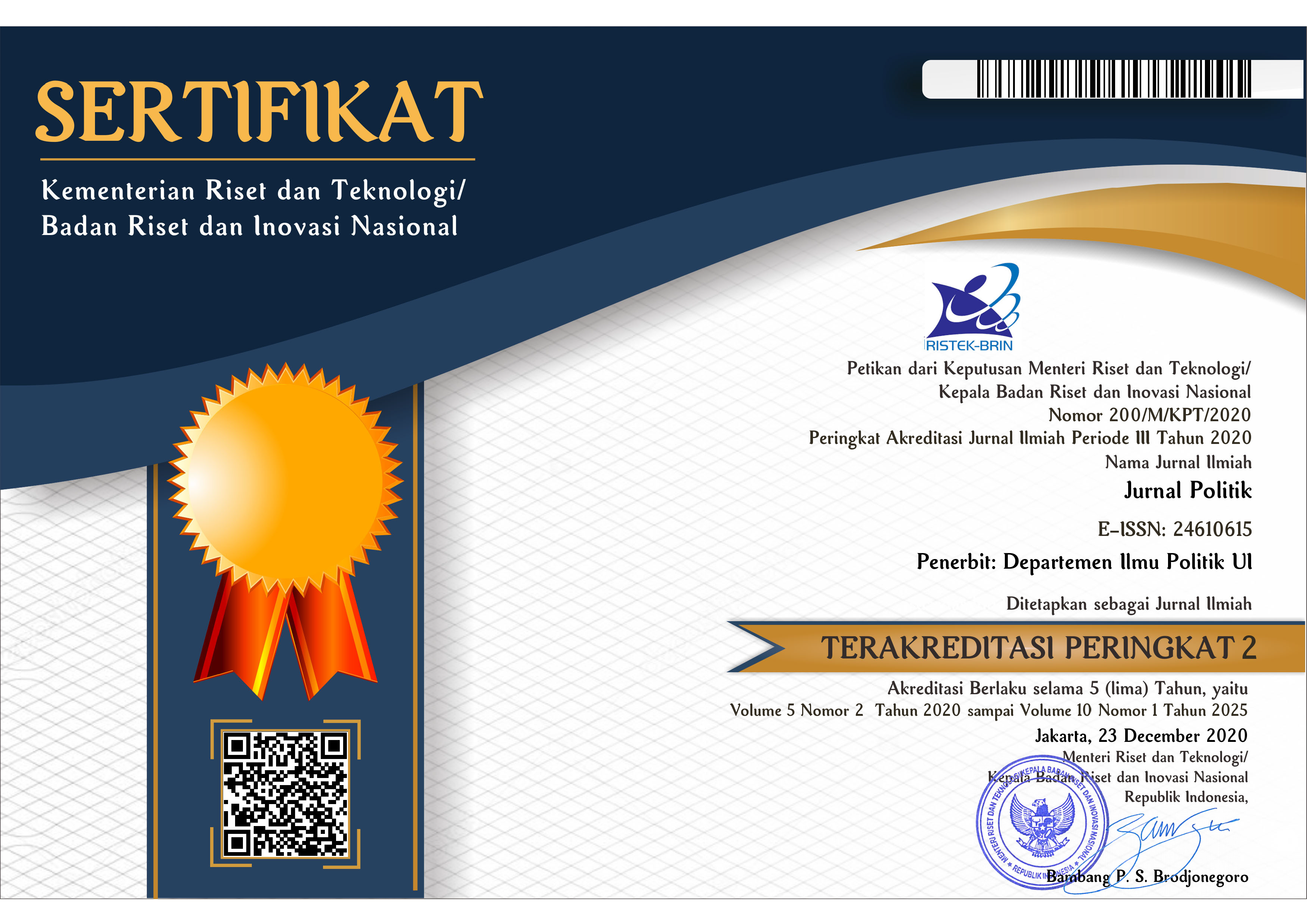Abstract
This article explains how power-sharing could determine conflict resolution in develo¬ping states, particularly in developing countries. This scheme offers a win-win solution between state actors and the separatist movements to curb conflict and initiate pe¬ace-building at the grassroots level. Using a quantitative analysis that employed data¬sets from Power-Sharing Event Dataset (PSED) and Implementation of Pacts Dataset (IMPACT), this article notably reveals two important findings. First, the most promising power-sharing schemes are territorial and political power-sharing. Furthermore, the preliminary talk about ideal power-sharing consensus between the state actors and rebel groups is important to determine the outcome of power-sharing policies. Finally, this article concludes that the state capacity shows the final conflict resolution. Strong states can manage ethnic conflict, while weak state capacity could exacerbate the ethnic conflict.
Bahasa Abstract
Artikel ini bertujuan menjelaskan potensi pembagian kekuasaan (power-sharing) sebagai kunci utama dalam konflik etnis, khususnya di negara-negara berkembang. Adapun skema pembagian kekuasaan ini sebenarnya menawarkan mengenai adanya solusi positif yang seimbang dan setara antara aktor negara dengan kelompok separatis dalam memutus konflik dan kemudian beralih menginisiasi adanya perdamaian di level akar rumput. Dengan menggunakan analisa kuantitatif melalui analisis dataset yang dikembangkan oleh Power Sharing Event Dataset (PSED) and Implementation of Pacts Dataset (IMPACT), artikel ini menunjukkan dua termuan penting. Pertama, skema contoh pembagian kekuasaan yang menjanjikan adalah pembagian wilayah utamanya lewat pemekaran daerah dan pembagian kewenangan politik antara aktor negara dengan kelompok-kelompok separatis. Temuan kedua adalah pembicaraan negosiasi pembagian kekuasaan yang ideal sebelumnya antara para aktor negara dengan kelompok separatis menjadi relevan dalam nantinya menghasilkan kesepakatan pembagian kekuasaan yang terikat hukum antara aktor pemerintah dengan aktor separatis. Konklusi dari studi ini adalah kapasitas negara menjadi faktor penting dalam mengelola konflik. Kapasitas negara yang kuat akan mampu untuk mengelola konflik sedangkan kapasitas negara yang lemah malah justru memperburuk konflik tersebut.
References
Aspinall, Edward. 2007. "From Islamism to Nationalism in Aceh, Indonesia". Nations and Nationalism 13 (2): 245–63.
Aurellio, Julie M. 2019. "Duterte holds 4th talk with Misuari in a year." Inquirer.net. August, 28. https://newsinfo.inquirer.net/1158298/duterte-holds-4th-talk-with-misuari-in-a-year#ixzz64uj17jOq
Baytiyeh, Hoda. 2019. "Lebanon’s Power-Sharing System and the Rise of Sectarianism". Peace Review 31 (2): 223–30.
Bertrand, Jacques. 2000. “Peace and Conflict in the Southern Philippines: Why the 1996 Peace Agreement Is Fragile.” Pacific Affairs 73 (1): 37–54.
Brown, David. 1988. “From Peripheral Communities to Ethnic Nations: Separatism in Southeast Asia.” Pacific Affairs 61 (1): 51–77.
Engineer, Asghar A. 1984. “Philippines: Struggle for a Separate Islamic State.” Economic and Political Weekly 19 (51/52): 2154–156.
Varshey, Ashutosh. 2009. "Ethnicity and Ethnic Conflict". In The Oxford Handbook of Comparative Politics, edited by Charles Boix and Susan C. Stokes. Oxford: Oxford University Press.
Chandra, Kanchan. 2004. Why Ethnic Parties Succeed: Patronage and Ethnic Head Counts in India. Cambridge: Cambridge University Press.
DeVotta, Neil. 2005. "From Ethnic Outbidding to Ethnic Conflict: The Institutional Bases for Sri Lanka’s Separatist War1". Nations and Nationalism 11 (1): 141–59.
Fakhoury, Tamirace. 2019. "Power-Sharing after the Arab Spring? Insights from Lebanon’s Political Transition’. Nationalism and Ethnic Politics 25 (1): 9–26.
Hendrix, Cullen S. 2010. "Measuring State Capacity: Theoretical and Empirical Implications for the Study of Civil Conflict". Journal of Peace Research 47 (3): 273–85.
Horowitz, Donald. 2014. "Ethnic Power Sharing: Three Big Problems". Journal of Democracy 25 (2): 5–20.
Huber, John. 2017. ‘“Why Worry about Inequality and Ethnic Politics?”’ In Exclusion by Elections: Inequality, Ethnic Identity, and Democracy, London: Cambridge University Press.
Kelegama, Thiruni. 2015. "Impossible Devolution? The Failure of Power-Sharing Attempts in Sri Lanka". Strategic Analysis 39 (3): 237–53.
Lijphart, Arend. 2002. "Negotiation Democracy versus Consensus Democracy: Parallel Conclusions and Recommendations". European Journal of Political Research 41: 107–13.
Lijphart, Arend. 2004. "Constitutional Design for Divided Societies". Journal of Democracy 15 (2): 96–109.
McGann, Anthony, and Michael Latner. 2012. "The Calculus of Consensus Democracy: Rethinking Patterns of Democracy Without Veto Players". Comparative Political Studies 46 (7): 823–50.
Ottmann, Martin, and Johannes Vullers. 2014. Power-Sharing Event Dataset (PSED) Codebook. Berlin: GIGA German Institute of Global and Area Studies.
Rajah, Ananda. 2002. “A ‘Nation of Intent’ in Burma: Karen Ethnonationalism, Nationalism and Narrations of Nation.” The Pacific Review 15 (4): 517–37.
Schnecken, Ulrich. 2002. "Making Power-Sharing Work: Lessons from Successes and Failures in Ethnic Conflict Regulation". Journal of Peace Research 39 (2): 203–28.
Williams, Dodeye. 2015. "How Useful Are the Main Existing Theories of Ethnic Conflict?". Academic Journal of Interdisciplinary Studies 4 (1): 147–52.
Recommended Citation
Jati, Wasisto Raharjo
(2021)
"Power-Sharing as The Key of Secessionist Conflict Resolution in Developing Democratic Countries,"
Jurnal Politik: Vol. 7:
Iss.
2, Article 16.
DOI: 10.7454/jp.v7i2.1083
Available at:
https://scholarhub.ui.ac.id/politik/vol7/iss2/16
Included in
American Politics Commons, Comparative Politics Commons, Geography Commons, International and Area Studies Commons, International Relations Commons, Political Theory Commons


